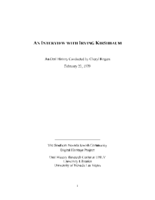Search the Special Collections and Archives Portal
Search Results
Corporate records, 1920 to 1992, 1927 to 1979
Level of Description
Scope and Contents
The corporate records (1920-1990) for Hughes Productions consist of administrative, distribution, financial, and legal records, as well as records from the Motion Picture Association of America and United Artists Corporation and records pertaining to unproduced works.
Administrative records contain correspondence, as well as vault inventories, assets list, and personnel files. Distribution records contain agreements, correspondence, and information pertaining to The Outlaw's ban. Financial records include ledgers, correspondence, invoices, and international profit reports. Legal records include contracts for actors and screenwriters, as well as correspondence, agreements, and affidavits pertaining to loan information and court case proceedings.
Motion Picture Association of America (MPAA) records consist primarily of weekly reports from the MPAA detailing film title registration reports either held or withdrawn, as well as memoranda. United Artists Corporation records include contract analyses, settlement statements and ledgers detailing The Outlaw's domestic and international earnings. Unproduced works contain screenplays, synopses, story treatments, right's agreements, and correspondence pertaining to stories sent to Hughes Productions.
Archival Collection
Collection Name: Howard Hughes Film Production Records
Box/Folder: N/A
Archival Component

Transcript of interview with James M. Bonaventure by Claytee D. White, September 9, 2014
Date
Archival Collection
Description
Text

Transcript of interview with Ron Lawrence by Dennis McBride, June, July and August 1997
Date
Archival Collection
Description
Ron Lawrence is one of the busiest people in the gay community, so I want him to know how much I appreciate his reserving time for me so that I could complete this oral history interview. The importance of his work toward the well-being of the gay community in Las Vegas cannot be measured, and much of what he's accomplished and otherwise made possible will live long after he leaves us. With Ron's consent to this interview, our knowledge of Nevada's gay history is greatly enriched and our record preserved.
Text

Transcript of interview with Irving Kirshbaum by Cheryl Rogers, February 23, 1979
Date
Archival Collection
Description
Interview with Irving Kirshbaum by Cheryl Rogers on February 23, 1979. In this interview, Kirshbaum discusses the Riviera Hotel where he began working in 1955. He also talks about the landscape of the Las Vegas Strip in the 1950s, and the state of gambling, comps, customer service, and dealer training. The interviewer asks about the treatment of minorities at the Riviera, and in Las Vegas generally, and the effect of corporate ownership on casinos.
Text

Interview with Louis John Vitale, May 19, 2004
Date
Archival Collection
Description
Text

Interview with Troy Ernest Wade II, June 16, 2004
Date
Archival Collection
Description
Text

Transcript of interview with Dorothy George by Claytee White, October 13, 2003
Date
Archival Collection
Description
After serving as a nurse in World War II in Hawaii, Okinawa and Japan, Dorothy returned home to Chippewa Falls, Wisconsin. She experienced a particularly bad winter and she set out for California but stopped in Las Vegas to visit the family of her traveling companion, a girlfriend from her home town. The girlfriend returned to Wisconsin and George applied for a nursing license and got it within three days. She never left. Dorothy met her husband while working the night shift at Clark County Hospital. He would come in regularly to assist his patients in the births of their babies. Their occupations and their service in World War II drew them together in a marriage that has lasted over fifty years. From 1949 to this interview in 2003, Dorothy George has seen Las Vegas grow from a town that she loved to a metropolitan area that is no longer as friendly. She reminisces about the Heldorado parades, family picnics at Mount Charleston, watching the cloud formed by the atomic bomb tests, raising six successful children, leading a Girl Scout Troop, and working in organizations to improve the social and civic life of Las Vegas.
Text

Interview with Ernest Benjamin Williams, October 27, 2004
Date
Archival Collection
Description
Text

Law School Study for the University of Nevada, Las Vegas (bound)
Date
Archival Collection
Description
A bound version of the "Law School Study for the University of Nevada, Las Vegas" by Dean Willard H. Pedrick, College of Law, Arizona State University, and Professor Lorne Seidman, Chairman, Department of Finance, College of Business and Economics, University of Nevada, Las Vegas. From the University of Nevada, Las Vegas William S. Boyd School of Law Records (UA-00048).
Text
